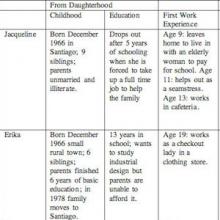North/Central America

Official Document, Women's Employment
The National Recovery Administration (NRA) was a New Deal response to the Depression to stabilize and energize the economy of the United States. One function of the NRA was to set industry standards for products, production methods, and wages. The codes developed for U.S.

Photograph, Needleworker
This photograph illustrates a home needleworker in the streets of San Juan around 1903. At this time, and afterwards, almost all needlework was done at home. Working at home allowed women to negotiate their own contracts with agents, who commissioned certain types and styles of work.
Press Release Regarding the Berlin Wall Memorial at the Baker Institute (Rice University)
In 2000, 11 years after the fall of the Berlin Wall, Rice University installed a section of the former wall as a permanent part of the Baker Institute.

Long Teaching Module: Women and the Puerto Rican Labor Movement
In December 1898, at the close of the Spanish-American War, Spain surrendered control of Cuba, Puerto Rico, and Guam to the United States. Though Cuba achieved nominal independence in 1902, in 1917 Puerto Rico assumed the status of an American territory, which afforded Puerto Ricans U.S.

Long Teaching Module: Gender and Health in Latin America, 1980-2010
Several decades have passed since the conclusion of what the United Nations addressed as the “Decade for Woman” (1975-1985). In many regions of the world, patriarchal relationships between men and women have been toned down, and hierarchies in gender roles have become less rigid.
Liberian Letters
Liberian Letters will fascinate teachers and students interested in the late history of slavery, manumission, and repatriation of people of African descent to Sub-Saharan coasts.
National Security Archive: Sources on Europe
These materials help students discover that history does not follow a predetermined course, but is the result of decisions, any one of which could drastically alter history’s outcome.
Russian Church and Native Alaskan Cultures
Supplementing each chapter are as many as 31 digitized images or manuscripts. The exhibit is both informative and thought-provoking.
Foreign Relations of the United States, Volume XVII: Near East, 1961-1962
These documents provide crucial historical evidence of the attitudes American diplomats and officials held toward the countries of the Middle East, as well as uncovering aspects of foreign relations from an American perspective at the height of the Cold War.